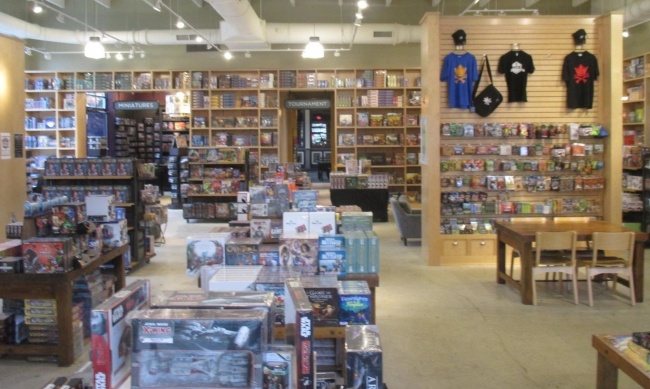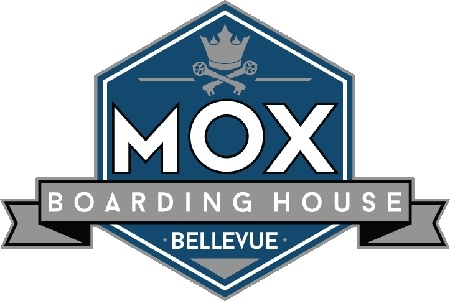We took advantage of a recent trip to the Seattle area to visit a state-of-the-art game store/café in Bellevue, Washington and talk to Andrew Mooseker, the retail manager. This was our first opportunity to see, up close, the new trend toward combining restaurant and gaming space (see "Board Game Cafes Hitting Public Consciousness").
The space is massive, a 25,000 square foot location which divides roughly into fourths, with the game store retail space, tournament space, restaurant (including private rooms available for rental by the hour), and “back-of-the-house” each taking up a quarter of the square footage.
This is the newer location of two under the same ownership. Mox Boarding House has been open for a little under a year, a second location by the ownership of Card Kingdom, in Ballard, Washington. Card Kingdom has been open since 2011 with the same concept: retail store, tournament space, and restaurant.
Although the inventory is very large and varied, the company isn’t afraid to skip titles that are working for other stores but don’t fit their clientele. This is particularly true in collectible games. For example, Mox doesn’t carry WizKids’ HeroClix, although it does carry Dice Masters. It also doesn’t carry a number of high profile CCGs, such as Yu-Gi-Oh, Cardfight!! Vanguard, and Force of Will.
We spoke to Mooseker about the store and its retailing strategies.
ICv2: It looks like the big brands are out front. Is that your strategy?
Mooseker: We try to have a good mix of everything from the little pocket games to the big titles that everybody knows as well.
How do you break your display down between types of games?
Our four big cores are board games, minis games, trading card games and roleplaying games. And then we break that down, so obviously there are family and kid games, more dense Euro-type games, and party games; so we break it down by genre and then by mechanics after that.
How does the food operation interact with the retail?
We have a library of 300 board games that you can check out and bring over to the restaurant. You can play a game, or play Magic, while you have a meal here in the café.
How’s that interaction between the food and play working out?
Really well. It’s a unique concept. It’s a "third place," it’s a place where you can go and hang out with your friends and family away from your screens.
Do you see people who try games in the restaurant end up buying them? Does it drive retail sales?
I think it does. We get people who will come and play game they wouldn’t normally pick up or a game that seems deeper than they would want to get into, but they try it and have a lot of fun with it and end up purchasing it.
Is the café seen as a profit center in itself or is it more just to drive the overall gaming environment?
It’s a profit center in itself, for sure.
How do you get people to try new games?
For trying new games, we do everything from the un-pubs, where we have people who are trying to get games designed and out onto the market. We’ll have a day where they can come and demo games. We have people bring in their Kickstarter games and demo them. We will also set up games when they first come in and teach people how to play them. There’s a whole bunch of different ways to get people to play new games.
Where do you hold the demos?
We’ll do those in the retail space.
How do you break down the board games in the retail space?
We have them broken down by both genre and mechanics, so you have co-operative games in one place, deck-building games in one place, and games that are generally sci-fi-esque, fantasy, and party games, bestsellers. You have different divisions.
So if you’re breaking down by genre and type of play, are you racking in multiple locations?
Not usually. We do have a couple games that are on our bestseller table that are also on the shelf, but mostly we stick to one spot.
Why do you go really high up the wall with the displays? (Games are shelved far above what shoppers can reach)
That is just our storage.
Do you do events every night?
Yes, we do different events every night. Tonight we’ll have two different Magic formats going, we’ll probably have more than 100 people here for that. We’re usually running around 120 for Friday Night Magic. We have a miniatures game following. People are playing minis games back there right now. We’ll have people coming on Tuesdays playing minis games. People come in on Saturdays learning to paint minis.
It looks like you have terrain set-ups for your miniatures players?
We do a lot of business with Privateer Press, Games Workshop, the X-Wing minis games. Privateer Press is right in our back yard, so we have a lot of fans.
Is each of those terrain set-ups for different games or are they generic?
You can play any of those games on any of those tables, other than X-Wing, which is in space.
Tell us about your industry night.
Monday nights we do an industry night for anyone involved in gaming, videogaming, minatures gaming, or anywhere in the gaming community since we have such a great community here in this Seattle-Bellveue-Eastside area. The whole Puget Sound area is a hotbed of gaming. We have people come in on Monday nights and we offer a discount in the café so you can come in, have a beer, play a game, hang out.
Do you get a good turnout for that?
Yes, we get a lot of people coming in for that. It’s really cool to see some of those people coming here, playing.
There’s an area with several computers set up, what are those for?
Those are for ordering Magic card singles. The TCG room is all Magic card singles, so you can place an order for just single cards and you pick it up at the kiosk.
So the singles inventory is in-store, but that’s the way the customer searches it?
Yes.
What trends are you seeing in the marketplace in terms of categories or specific titles on which sales are expanding or contracting?
Board games just continue to grow. People who a few years ago were picking up very light games, are picking up heavier and heavier games as time goes on. I think they’re doing a really good job of making even those games that seem real difficult to get into; people are starting to pick them up and play them. The reality is that market is really continuing to grow.
Is the top end of that funnel also still happening? Are you still getting new people in trying the lighter games?
Yes, we see new people all the time buying new games, getting started into things. Obviously this is time where you have a ton of new titles coming out. Quarter 4 is always our biggest with new releases. We just saw two new releases this week. Timeline Challenge is a big game this time (see "’Timeline Board Game’"). And then you have T.I.M.E. Stories, which is a deeper game, but people are super excited (see "Asmodee’s Anticipated Titles").
How’s the collectible games business?
All good. Magic’s still our biggest thing.
How about in miniatures? Has the relaunch of Warhammer Fantasy Battles worked?
There are people that are playing it. It’s definitely a game for new players or for people who want to play a much more casual game. It’s a little mixed, but I think people who have picked it up are enjoying it.
Does that mean that people who like the heavier style game are less enchanted with it?
I think so. I think that’s a safe bet.
What’s going on with RPGs?
D&D and Pathfinder; obviously both are based here in the Northwest so we know both teams well. We also see a lot of things out of indie RPGs. There’s a lot of cool indie RPGs that are out.
What would be the best indie RPGs?
I don’t even know if it would be considered indie anymore, but my favorite is the Fate System. Fate System is really good and I also like Dread a lot, it’s a very unique system. Dread is a horror game system where you’re using a Jenga tower instead of dice.
Click the Gallery below to see photos of Mox Boarding House.

A 25,000 Square Foot Game Store / Restaurant
Posted by Milton Griepp on November 11, 2015 @ 3:42 pm CT




 View Gallery: 23 Images
View Gallery: 23 Images